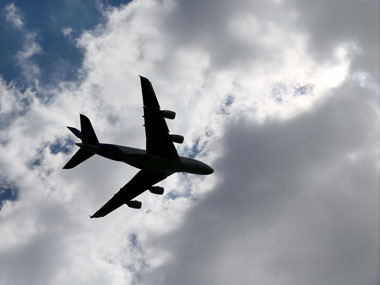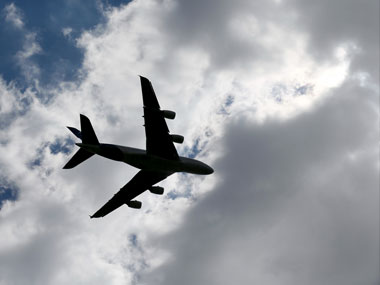New Delhi - Sudden travel due to an emergency in the family or for a job interview and the air ticket is priced beyond your reach? Help is at hand, as air fares could well be capped on domestic routes soon. The ministry of civil aviation is once again considering a proposal to cap fares, though the mechanism it will adopt to do so is not clear. Neither is a timeline. This, despite a recent study by the DGCA which showed that on 20 busiest domestic sectors, revenue earned and the number of seats sold by scheduled private airlines was under 4% in the highest fare bucket. [caption id=“attachment_2665850” align=“alignleft” width=“380”]  Reuters[/caption] In other words, very few seats are being sold at exorbitant prices and this usually happens on last-minute bookings. Since 1994, airlines have been free to price their tickets and the government has had no say in fares. Civil aviation secretary R N Choubey said on Saturday that fare capping was very much under the ministry’s consideration. “Today, airlines decide price bands (upper and lower limits for each sector) and they are merely required to display these fares on their websites. The suggestion we are examining is whether these bands should be decided keeping certain parameters in mind… We are not looking at any cap on the lower price band.” That this assertion of Choubey flies in the face of facts is evident from data as per the DGCA study quoted earlier. It showed that Jet Airways earned close to 96% of its revenue on the Delhi-Dehradun sector by selling tickets at various price bands lower than the highest fare. On this sector, less than 1% of total seats offered by Jet Airways were sold at the highest priced ticket. IndiGo’s biggest indiscretion was on the Kolkata-Chennai sector where it earned just 0.47% of its total revenue from the highest priced tickets, by selling 0.17% of its seats. GoAir earned just 3.41% of its revenue on the Delhi-Patna route through the highest priced tickets by selling less than 1.3% of total seats on the sector on this fare. Similar stats are available for SpiceJet, Vistara and AirAsia India. The highest revenue share from highest priced tickets was just 3.52% across India’s six private airlines. This was shown for just one private airline on one sector. Other airlines earned ridiculously low revenue share from highest priced tickets across various sectors, punching holes in the war cry against exorbitant air fares. To a question on whether any move to cap fares would not violate provisions of the Aircraft Rules 1937, he siad, “We will remain within the law. But some regulation in maximum fares for all routes - Category I, II, IIA and III - is being examined.” Choubey ruled out capping lower-than-cost or lowest fares on any sector, saying any complaints on predatory pricing by airlines are anyway the domain of the Competition Commission of India. It is interesting to note that a senior ministry official had explained last week that during the Jat agitation some moths back, fares from Delhi to Chandigarh had risen to over Rs 90,000 on one privet airline. It seems when officials of the airline were summoned for an explanation, they said this fare was a sum total of fares on three different sectors that the flight would have covered to reach from Delhi to Chandigarh, since a direct connection was not available. “They said on no sector did the fare breach the highest limit already published and hence they did not violate any rule. This is a silly explanation since the airline lost goodwill worth lakhs and we have suggested that in future, it should unilaterally decide to lower fares in case of such unforeseen events even it means booking a loss,” this offiicial said. It might make sense for the government to nudge airlines to keep fares reasonable in case of natural calamities or other unforeseen circumstances but an all-round capping would be a bad idea. Anyway, the latest data from DGCA corroborate what the regulator had found in an ealier study as well, which was conducted for fares in 2014. Here again, airlines were spared the blushes as the number of seats sold on the highest fare bucket were minimal. Then, in a seperate check on air fares on 10 busy domestic routes by the ministry of civil aviation last Diwali again found airlines pricing tickets at “reasonable” levels. Though air passenger associations have questioned such data in the past and some industry experts warn that DGCA is not really equipped to conduct such an analysis - the fact remains that India should stay away from price raj. It will be in no one’s interest if the state begins to control air fares. Over the last several months, dozens of Members of Parliament have spoken in one voice on the urgent need to cap air fares, saying airlines are fleecing flyers. A Parliamentary Standing Committee, in fact, recommended earlier this month that there should be a cap on at least Economy Class fares, alleging that airlines have been charging “predatory” fares during peak seasons. If the government actually accedes to the MPs and caps air fares, it would be doing the airlines a huge disservice. In a highly competitive domestic airline industry which has been bleeding for years due to the government’s own skewed taxation policies, capping of fares is neither practical nor advisable. Besides, capping could embolden airlines to seek an assurance from the government over return on investment, like in the case of airports with regulated tariffs. Just like cab rides, flyers rarely complain when they get one-way, all inclusive tickets of about Rs 1,000 or Rs 1500 or similarly ridiculous low prices. They also forget to vent their anger on social media when they book seats on an airplane at dirt cheap prices through advance booking. As per existing laws, air fares cannot be capped. With the repeal of Air Corporation Act in March 1994, the provision of airfare approval was dispensed with by the Government. Under the prevailing regulation (Sub Rule (1) of Rule 135 of the Aircraft Rules, 1937), every air transport undertaking engaged in scheduled air services is required to establish tariff, taking into account relevant factors such as the cost of operation, characteristic of service, reasonable profit and the generally prevailing tariff. In addition to the legal hurdle on capping fares, the ministry is also bound by its own earlier directive which asked all airlines to display fares on their websites in compliance of Sub Rule 02 of Rule 135, Aircraft Rule 1937. Airlines remain compliant to the regulations as long as the fare charged by them does not exceed the fare structure displayed on their website. And this stipulation has rarely been broken. The DGCA has a fare monitoring unit (TAU) which regularly analyses fares and whether airlines are violating the fare buckets which are already pre-determined for each route. Then, the Competition Commission of India also steps in occasionally, checking air fares. The best way to allow the airline sector to grow is to let carriers decide how to price tickets, where all to mount flights and what business model to follow. Already, airlines are fuming over a proposal to cap fares to regional routes at Rs 2500 per hour of flying. This is one of the proposals in the Draft Civil Aviation Policy. Fare capping would introduce more red tape into a sector which is already suffering financially due to skewed taxation policies. Why not nudge the airlines to find a solution to last-minute high fares through consultation instead of a dictat?
Why not nudge the airlines to find a solution to last-minute high fares through consultation instead of a dictat?
Advertisement
End of Article


)

)
)
)
)
)
)
)
)



